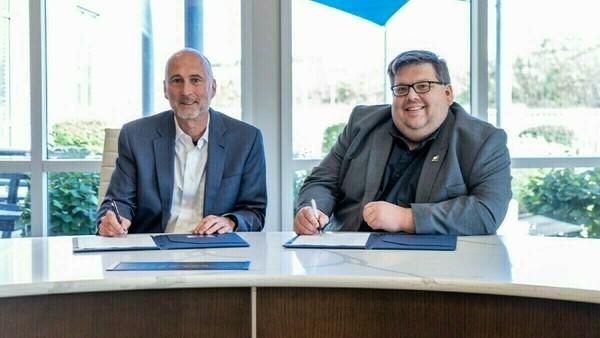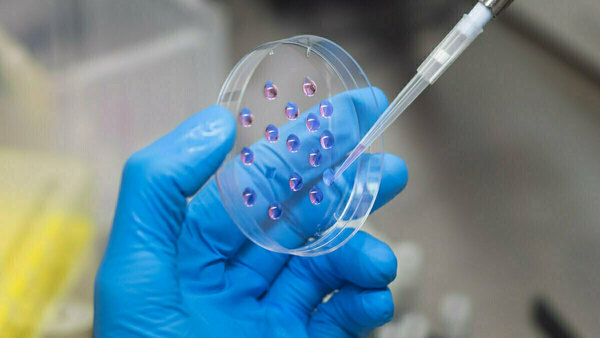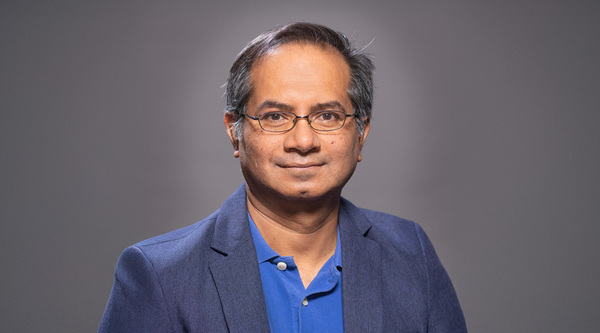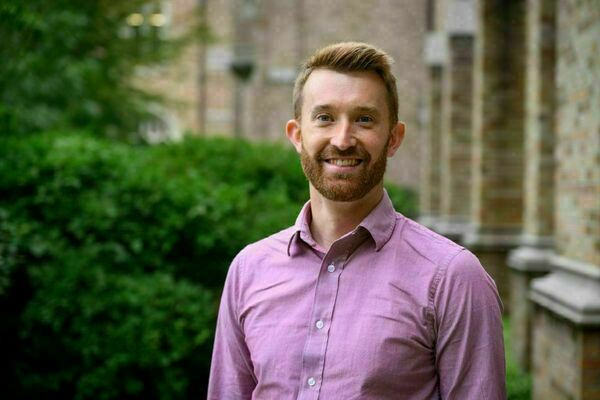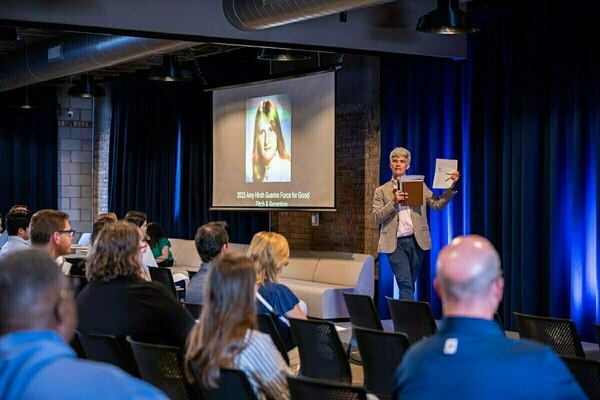Notre Dame’s R.I.S.E. AI Conference builds interdisciplinary collaboration to inform human-centered artificial intelligence
As artificial intelligence (AI) transforms nearly every sector of society — from healthcare and education to governance and global development — a critical question emerges: How can we conscientiously design and deploy these powerful technologies to positively impact society?
This question lies at the heart of the R.I.S.E. AI Conference in early October, hosted by the University of Notre Dame’s Lucy Family Institute for Data & Society. The Conference will welcome more than 330 participants from over 16 countries, 55 companies, and 38 universities to the Notre Dame campus to explore AI’s societal impact grounded in the principles of Responsibility, Inclusion, Safety, and Ethics (R.I.S.E.).

Inspired by the University’s longstanding commitment to advancing common good, the conference offers an interdisciplinary approach to AI with a clear lens on societal impact, featuring breakout sessions, panels, workshops, and six research tracks to reflect the diverse landscape of AI, not only along R.I.S.E. AI dimensions but also representative of several of the University-wide initiatives within the 2033 Strategic Framework of the University. The research tracks will feature cutting-edge innovations in R.I.S.E. AI presented by global researchers who were selected from a pool of over 170 abstracts submitted during the spring of 2025.
“The Lucy Family Institute for Data & Society is committed to translating data and AI innovations into impactful solutions for society’s greatest challenges,” said Nitesh Chawla, the Frank M. Freimann Professor of Computer Science and Engineering and the Lucy Family Director for Data and AI Academic Strategy, leading the Data, AI and Computing Initiative. “The R.I.S.E. AI Conference serves as a catalyst for this mission — placing human-centered innovation and societal impact at the core of AI, while bridging academia and industry to advance responsible innovation and applications across sectors,” Chawla added.
The R.I.S.E. AI Conference features a lineup of globally recognized speakers from academia, industry, and nonprofit organizations. Keynote addresses will be presented by Father Paolo Benanti, TOR (Luiss Guido Carli University); Arnab Chakraborty and Dayle Stevens (Co-CEOs of the Accenture – Telstra Data & AI Joint Venture); Xin “Luna” Dong (Meta); Stacy Garrett-Ray, M.D. (Ascension); Juan Gilbert, Ph.D. (University of Florida); Michelle Hermiston, M.D. (VinUniversity); Robyn Kress (Ascension Foundation); Ketan Paranjape, Ph.D. (Optum); Michael Pencina, M.D. (Duke Health); Sriram Raghavan (IBM Research); and Aarti Singh, Ph.D. (Carnegie Mellon University).
Unique sessions and panel discussions will include an exploration of AI’s impact in Latin America, the role of AI in artistic expression and how University of Notre Dame alumni are developing and leveraging AI in their professional roles.

Within the Conference, the Health AI Forum, which has evolved from the Lucy Family Institute’s Health Equity Data forums, invites a diverse group of healthcare stakeholders to tackle challenges of health access and outcomes at the intersection of health research, data science, and AI. Centered on rural health, the keynote speeches, research poster presentations, panel and roundtable discussions will consider emerging AI technologies that may enhance health transparency, optimize access to care, and increase continuity of care for aging individuals with mental health challenges.
“Data and AI offer transformative potential for understanding and improving healthcare, particularly in rural settings where access to facilities can be limited and healthcare workforce shortages persist,” said Fang Liu, Notre Dame Collegiate Professor and Associate Chair in the Department of Applied and Computational Mathematics and Statistics, and director of the Health Data Exploration and Analytics Lab at the Lucy Family Institute. “Through the Health AI Forum, we are creating a space where real problems meet rigorous research — actively promoting dialogue between practitioners and researchers and enabling new models and methods to take shape with direct relevance to rural communities.”
Other Conference activities include a series of poster sessions from faculty and student researchers representing over 38 universities, and several networking receptions. Poster presenters also have the opportunity to receive Societal Impact awards for collaboration, global impact or transformative change through data science and AI research. These awards will be announced at the R.I.S.E. AI Conference closing dinner.
“My hope is that the R.I.S.E. AI Conference becomes a catalyst — not just for advancing AI research, but to position the University of Notre Dame as a leader in ensuring that AI is developed with responsibility, inclusion, safety, and ethics at its core,” said Chawla, who is also the founding director of the Lucy Family Institute for Data & Society. “Together, we can chart a future where AI truly serves the common good.”
For more information about the R.I.S.E. AI Conference, please visit lucyinstitute.nd.edu/rise-ai.
Contact:
Christine Grashorn, Program Director, Engagement and Strategic Storytelling
Lucy Family Institute for Data & Society / University of Notre Dame
cgrashor@nd.edu / 574.631.4856
lucyinstitute.nd.edu / @lucy_institute
About the Lucy Family Institute for Data & Society
Guided by Notre Dame’s Mission, the Lucy Family Institute adventurously collaborates on advancing data-driven and artificial intelligence (AI) convergence research, translational solutions, and education to ethically address society’s vexing problems. As an innovative nexus of academia, industry, and the public, the Institute also fosters data science and AI access to strengthen diverse and inclusive capacity building within communities.
Latest Research
- Notre Dame, Beacon Health System announce new, multiyear research collaborationThe University of Notre Dame and Beacon Health System have announced a new, multiyear research collaboration. Through this agreement, Notre Dame and Beacon will jointly develop collaborative, health-focused research projects that are of interest to both organizations, particularly in the areas of oncology and health data.
- Fighting to cure brain cancerTo better understand glioblastoma, an aggressive brain cancer, a Notre Dame researcher thought outside the box—and off planet Earth. Read the story
- ND electrical engineer Ranjan Singh named founding editor-in-chief of APL Engineering PhysicsRanjan Singh, professor of electrical engineering at the University of Notre Dame and pioneer in terahertz photonics, spintronics and metamaterials, has been named founding editor-in-chief of Applied Physics Letters (APL) Engineering Physics.
- Exceptional faculty recognized as Notre Dame’s 2025 All-Faculty TeamNotre Dame has a long history of outstanding student-athletes being named to All-America teams. The University also has a tradition of honoring exceptional faculty on the football field each fall. At every home game, the provost honors a distinguished member of the faculty. These seven scholar-teachers…
- Localizing global environmental challenges through Just Transformations to Sustainability InitiativeThis story is part of a series of features highlighting the managing directors of the University's strategic initiatives. The managing directors are key (senior) staff members who work directly with the faculty…
- Career planning platform Runwayz takes home the Amy Hirsh Guarino AwardOn Friday, September 19, members of the University of Notre Dame and South Bend communities gathered to celebrate the legacy of Amy Hirsh Guarino by recognizing a local venture that best embodies the ideals of the University and reflects Amy's values of hard work, helping others, innovation, and community service.








